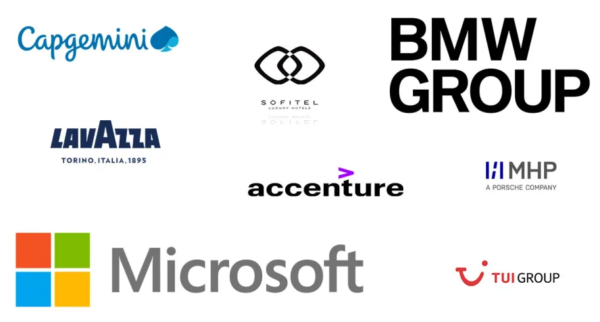BSc (Hons) BUSINESS INFORMATION SYSTEMS

Course Start Date
100% International
Learning Format
Duration
Tuition fee

Start your Bachelor in Business Informations Systems online
Course Overview
Are you ready to unleash your potential and launch an exciting career in the dynamic field of business information systems? Do you have a passion for optimising business operations, improving data-led decision-making and influencing strategy? If so, this online undergraduate degree will give you the skills to get ahead and stand out.
With the need for effective information processes and systems in every organisation, this online BSc (Hons) Business Information Systems degree will give you the skills to graduate into a thriving job market.
Learning at your own pace via our innovative digital learning platform, you’ll have the freedom to study from anywhere in the world, at any time that suits you.
CURRICULUM
-
Introduction to computer science
Information representation, algorithms and data structures. You’ll be exploring the keys concepts of computer science as well as developing your programming skills and examining hardware, networks and software systems. -
Business 101
Business 101 teaches you the fundamentals of business administration and doing business. Gain insight into general organisational approaches of companies. -
Object-oriented programming with Java
Study the key elements of Java, applying Java programmes to solve concrete problems. Develop an understanding of basic object-oriented concepts and how they differ from one another. -
Statistics – probability and descriptive statistics
Learn the essentials of probability and descriptive statistics. Explore random variables, probability density distributions and key statistical concepts. Understand inequalities and limit theorems. -
Collaborative work
Build key interdisciplinary competency to develop connections and navigate networking opportunities. Learn about:-
collaborative learning and working practices
-
constructive cooperation with others
-
creative thinking
-
empathy
-
emotional intelligence.
-
-
Requirements engineering
Defining the technical requirements for an IT system is one of the major steps in software development. Explore the techniques in documenting procedures and learn to apply them in business. -
Management accounting
Learn about the role management accounting plays in business profitability. Develop your knowledge of cost and performance measurements and their impact on internal decisions, controls, and budgeting processes. -
Data structures and java class library
Develop your object-oriented programming knowledge with a deeper understanding of data structures and their application in the Java language. OnIn this module you’ll apply and compare various objects in Java, explore the functionality of character strings and calendar objects, and understand how streams in Java are used.
-
Introduction to academic work for IT and technology
Develop an understanding of scientific thinking and academic work, with a focus on how to apply theories, methods, and models related to IT, and how to produce independent academic papers by analysing and classifying different sources of literature.
-
Introduction to process management
Understanding how to implement processes and manage change is key to success in business. Gain experience in enterprise modelling and learn to identify challenges, so you’re better equipped to manage risk.
-
Corporate finance and investment
Introduction to the theory and practice of corporate finance, the role of financial markets and investment processes. Learn the fundamentals of modern corporate finance, risk factors and financial statement analysis, – including investment processes and estimating expected cash flows.
-
Fundamentals of IT and ERP systems
Open-source software and cloud computing have opened new possibilities for business. Gain an understanding of their role in successful enterprise resource planning and how they can improve competitive advantage.
-
Database modelling and database systems
Our society relies on stored data. So that data needs to be retrieved and processed quickly when it’s needed. Discover the database tools and techniques that the modern world depends on, including SQL and NoSQL.
-
Digital business models
Learn about underlying patterns and key factors influencing digital business models – how does a company generate, deliver and secure value? Get an overview of business model concepts, including the influence of digitalisation.
-
Elective A (see Electives A section below)
-
Elective A (see Electives A section below)
-
Data analytics and big data
As well as evaluating data mining and big data projects in terms of their practical feasibility, technological requirements and limitations, you’ll also consider the legal aspects such as data protection.
-
Seminar: current topics in computer science
Make a deep dive into a topic of your choice – such as Java and web development, database systems, or programming languages. Presenting your research findings in a seminar and gaining feedback will strengthen your skills.
-
Elective B (see Electives B section below)
-
Elective B (see Electives B section below)
-
Elective C (see Electives C section below)
-
Elective C (see Electives C section below)
-
Undergraduate (bachelor) thesis
Apply the subject-specific and methodological competencies learned throughout your course to present an academic dissertation. You’ll also learn how to tackle a practical-empirical or theoretical-scientific problem.
-
IT law
Learn how to navigate through contracts, respect intellectual property rights, handle copyright, software patent issues, grasp the core ideas of data protection, and assess the different approaches to IT law across regions like the European Union, the United States, and India.
-
Intercultural and ethical decision-making
Gain the skills to understand intercultural competencies, diversity, and ethics development. Plan and implement learning processes in these areas by creating a case study.
-
Programming information systems with Java EE
Master Java technology stack for web applications, learning to create tailored web solutions to solve specific problems. This practical module will equip you with the skills to assess and apply diverse web technologies for building application interfaces, integrating business logic and connecting to database systems.
-
Agile project management
Gain a practical introduction to agile project management and learn to distinguish it from a plan-driven approach. Learn the values, activities, and roles of typical agile procedures and practice with an example project.
-
Project: AI excellence with creative prompting techniques
Immerse yourself in generative AI as you explore and apply prompting techniques. Create AI-generated content and assess the effectiveness of your prompts. Refine those skills in real-world scenarios while considering the ethics of the design and use of AI for basic prompting techniques.
-
Theoretical computer science and mathematical logic
Explore key concepts at the heart of applications such as Structured Query Language (SQL) queries. You’ll examine the difference between propositional and predicate logic and experiment with Petri nets or define the P-NP problem.
-
Internship I (*)
Develop your practical and analytical skills by doing an internship and improving your employability. In several preparation tutorials, you’ll consider the working environment and the overall goal of your placement. -
Internship II (*)
As with the first internship, this is an opportunity to apply your skills and knowledge in an entrepreneurial environment. Develop your communication style, problem solving ability and time management.
* Check eligibility before booking the module.
Big data and business intelligence
-
Big data technologies
This module introduces the four ‘Vs’ of data – and data sources and types. Learn about the most common data storage formats and the challenges large amounts of data pose for underlying infrastructure. -
Cloud computing
An introduction to cloud computing, its enabling technologies, and analytics capabilities. Learn about cutting-edge advances like serverless computing, storage, and popular cloud offerings.
IT operations and project management
-
IT service management
Learn about the IT services that keep IT systems running. This module builds knowledge and expertise to provide IT services to organisations, mainly based on the IT Infrastructure Library (ITIL). -
Project: IT service management
Take the opportunity to analyse and evaluate certain aspects of IT service management within a project framework. You can apply the theory you have learnt to propose practical solutions to company-specific situations.
Cyber security
-
Introduction to data protection and cyber security
This module covers important IT security concepts. Learn terminology, typical application fields, IT security application areas, and standard procedures and techniques. -
Cryptography
Hash functions, One-Time Pad, symmetric and asymmetric methods. Sounds like a different language? Analyse the various cryptographic processes so you’re equipped to protect critical data in today’s online society.
International marketing and sales
-
International marketing
Learn about strategic marketing in an international context including cultural differences and how they influence international marketing management. Gain insight into:-
international market research
-
strategic planning
-
and the ethics of international marketing.
-
-
Online marketing
Examine different types of online marketing such as advertising campaigns and email marketing. You’ll compare channels, consider legal aspects like GDPR and evaluate campaigns with web analytics.
Supply chain management and industry 4.0
-
Supply chain management I
Gain a theoretical and a practical view of supply chain management (SCM). You’ll consider logistical and modern processes, flows and network standards for SCM. -
Supply chain management II
Learn how to build and maintain a competitive advantage through robust SCM. Analyse strategic activities and instruments in the Plan, Source, Make, Deliver, and Return process categories.
Human resources
-
Introduction to new work
Companies are moving away from bureaucratic systems and hierarchical structures towards empowerment, democracy and self-management. Develop an understanding of agile principles and the implications for HR and leadership teams. -
Organisational behaviour
This module allows you to examine corporate culture, organisational structures, and individual mechanisms. Explore leadership styles, power structures, negotiation strategies, decision-making and more.
Big data and business intelligence
-
Business intelligence
This module introduces the procedures and models for data provision, information generation and analysis. Build skills in data warehousing and develop techniques to optimise business activities. -
Project: business intelligence
This module introduces the procedures and models for data provision, information generation and analysis. Build skills in data warehousing and develop techniques to optimise business activities.
IT operations and project management
-
IT project management
This module provides fundamental IT project management concepts. Learn about project management and organisation, develop cost-management skills, and solve IT project management problems. -
IT architecture management
This module defines a future blueprint for particular IT developments, including service strategies and available technologies for IT service providers.
Cyber security
-
Technical and operational IT security concepts
Confidentiality, integrity and availability are key issues in today’s IT systems. As well as learning how to evaluate an IT network, you’ll develop protection profiles, design monitoring tools and interpret Big Data. -
Project: configuration and application of SIEM systems
With help from a tutor, you’ll take on the challenging task of implementing a Security Incident Event Management tool in an enterprise IT environment. Look at the data sources and formats and learn to convert technical data into operational information.
International marketing and sales
-
Applied sales I
Globalised demand and intense competition mean that winning customers is increasingly difficult. So, effective sales thinking is vital. Examine key concepts like sales organisation and alternative channels – plus, fine-tune your negotiation skills. -
Applied sales II
Deepen your knowledge of fundamental sales principles. Explore how customer satisfaction and loyalty contribute to successful sales management and apply your skills in a real-world case study.
Supply chain management and industry 4.0
-
Product development in industry 4.0
In the context of the fourth industrial revolution, you’ll look at the impact of new trends on product development. Consider how alternative approaches to design put the consumer at the centre. -
Project: smart product solutions
In a practical project framework, showcase how you’ve applied agile engineering methods to smart product solutions. And demonstrate you can choose the right tools to analyse different business models.
Human resources
-
Digital HR
Digitalisation has enabled HR departments to escape their traditional image as personnel ‘administrators’. Explore the value they can add through the latest technological developments, such as artificial intelligence. -
International HR management
This module provides an overview of special features, opportunities, risks and challenges in country-specific and cross-national human resources management and cross-border mergers and acquisitions.
KEY FEATURES
WES Recognized -
Canada and America System
Accreditation & Recognition
Accredited in line with European standards
Mode of Teaching
Online
Degree Awarded
Earn the same LIBF Degree as awarded On-Campus
Assistance
Job Assistance program to land you your dream job
Alumni Status
Alumni status from LIBF
Work Permit
24-month post-study work visa
Employment
94% success rate in employment
Country
United Kingdom
LIBF Alumni Work at

Talk To Our Admissions Counselors Now!
ADMISSION DETAILS
APPLICATION PROCESS WITH LEXTORAH
The application process takes 14 working days and it consists of four simple steps. An offer of admission will be made to the selected candidates and accepted by the candidates by paying the admission fee.
Step 1
Submit Application
Step 2
Application Review
Step 3
Telephonic Discussion
Step 4
Admission Completed
LEXTORAH ADVANTAGE
Scholarship
Get up to 60% in scholarships when you apply through Lextorah
Free Course
Free IELTS/TOEFL training course
Job Assistance
Get premium access to latest and relevant opportunities on top job platform.
Visa Assistance
Visa Assistance to take care from Application to Interview
Free Trial for Fully Online
30 day trial period to decide if the course is ideal for you or switch to another course
FREQUENTLY ASKED QUESTIONS
The online Bachelor programme in Business Information Systems offers you the perfect mix of theory and practice. It addresses current economic trends with an international focus. You’ll have the opportunity to specialise and to work on your soft skills during fascinating courses such as Collaborative Work or Intercultural and Ethical Decision-Making.
During your Bachelor studies in Business Information Systems, you can pick the electives that allow you to focus on the industry-specific subjects of your choice. Additionally, you have the chance to develop your technical IT skills or even learn a foreign language. The study programme is taught in English to prepare you for an exciting international career.
The order of courses presented below is for the online studies model of this programme.
The content will be a mix of interactive lectures from industry leaders as well as world-renowned faculty. Additionally, the program comprises live lectures or hangout sessions dedicated to solving your academic queries and reinforcing learning. In the final semester of the course, you will be writing a Thesis and participate in Colloquium.
The online program schedule is designed to ensure that you can successfully study alongside your job. Devoting 12-15 hours every week should be enough to graduate from the program. However, the more time you devote, the greater will be your learning from the program.
Post successful completion of the course, you will get a Bachelor of Business Administration (180 ECTS) Degree from LIBF, UK.
Typically you can pursue a B.A in business administration after completing your 12th. At LIBF, we welcome international students to take advantage of our bachelors programs, and a business administration degree opens you up to opportunities in a variety of industries! With LIBF, you can also complete your B.Sc. in business management online so you can pursue the degree no matter where you are located!
The United Kingdom has one of the lowest unemployment rate across Europe of 5%.
As a student, you can work 30 – 35 hours per week or 120 full days part-time during the year. Typical wage in the UK is around £16 per hour.
If you want move to the UK for your studies, you need to prove you have sufficient financial resources to support yourself in the UK, you have to deposit the average living cost in the UK is £24,000. This amount may vary depending on your lifestyle in the UK.
International students who have successfully completed an undergraduate or master’s degree can apply to stay in the UK for up to two years after their studies. PhD graduates can apply to stay for up to three years.
LIBF IS an internationally recognised organisation delivering outstanding education.
Over the last 140 years, we’ve created connections to the business world. Today, LIBF provides
students with everything they need to learn flexibly online, anywhere in the world – or in a full-time
blended learning format from our London campus. With a focus on life-long learning we equip our
students with globally recognised qualifications to achieve their career goals.
LIBF UK prides itself on small class sizes. The typical class size at LIBF UK is 30 students. LIBF also has a well-established career centre that helps students in getting jobs. 94% of IU graduates receive a job offers within 6 months of completion of the course.
Online:
We guarantee LIBF online students maximum flexibility, so you can choose your own starting date in your application. LIBF has multiple intakes per year, you can apply at any time.
On-Campus: IU on-campus programs have fixed starting times. See the course pages for more.
Click the Apply Now button on the course page and fill out the form. Our Admissions Counselor will get in touch as soon as possible.